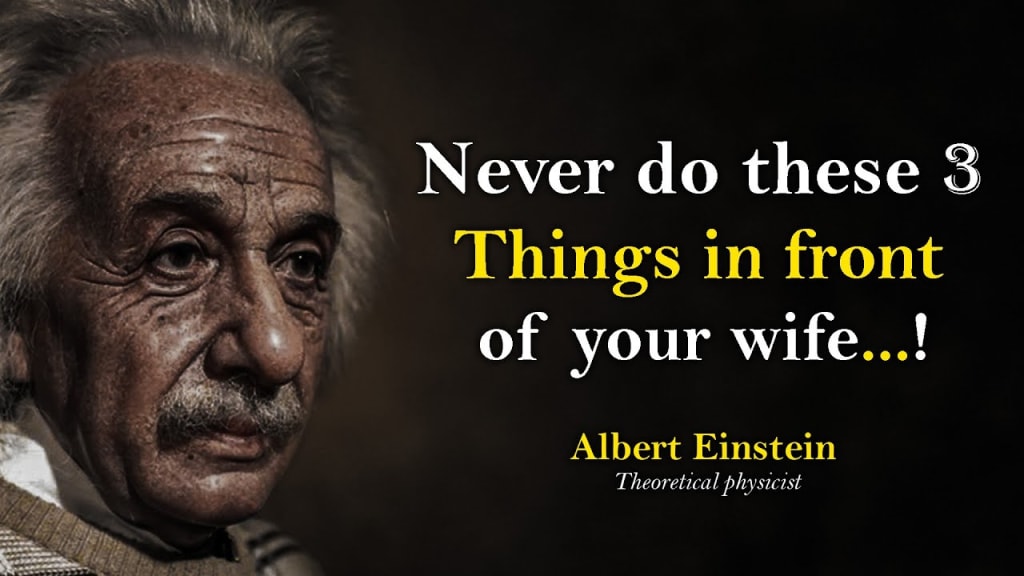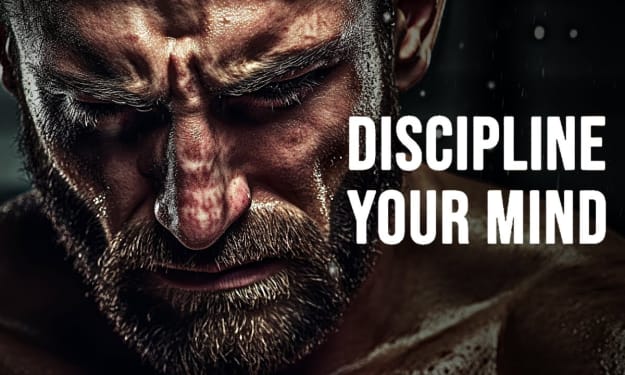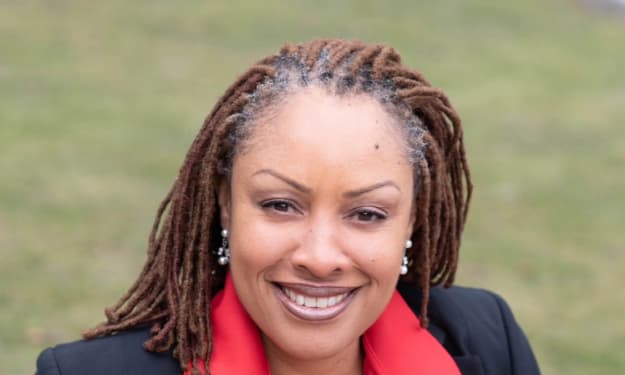Never do these 3 Things in front of your wife...!
The Forgotten Knowledge

Article Outline
1. Introduction
- The importance of education beyond schooling
2. The Forgotten Knowledge
- How education goes beyond memorization
- The value of critical thinking and problem-solving
3. Changing Diapers and Politicians
- The need for frequent change in leadership
- The role of politicians in society
4. Achieving Peace Through Understanding
- The limitations of force in maintaining peace
- The importance of empathy and communication
5. Embracing Mistakes and Trying New Things
- The relationship between mistakes and growth
- The benefits of taking risks and exploring new opportunities
6. Kindness as a Universal Language
- The power of kindness to bridge gaps
- How acts of kindness can impact others
7. The Intersection of Science and Religion
- The complementarity of science and religion
- The importance of embracing both aspects
8. Engaging with Different Perspectives
- Dealing with disagreements and stupid people
- The value of open-mindedness and critical thinking
9. Embracing the Present and the Future
- Finding balance between the past, present, and future
- Seizing opportunities in everyday life
10. Attitude and Character
- The connection between attitude and character
- Cultivating a positive and strong mindset
11. The Media and Information
- The impact of media consumption on knowledge
- The importance of critical media literacy
12. The Vastness of the Universe and Human Stupidity
- Reflecting on the infinite nature of the universe
- Recognizing human fallibility and limitations
13. The Journey of Life
- The analogy of life as riding a bicycle
- The importance of continuous progress and growth
14. Discovering Purpose and Meaning
- The significance of self-discovery and purpose
- The impact of knowing one's purpose in life
15. Value over Success
- Shifting focus from success to personal values
- Making a difference through meaningful actions
16. Questioning Authority and Seeking Truth
- Challenging blind belief in authority
- The importance of critical thinking and seeking truth
17. The Complexity of Human Nature
- Understanding the intricacies of human behavior
- Finding solace in the companionship of animals
18. Relationship Advice
- Three things to avoid doing in front of your wife
19. The Illusion of Democracy
- Reflecting on the true impact of voting
- Analyzing the power dynamics in society
20. The Power of Knowledge and Information
- Encouraging a thirst for knowledge
- The benefits of continuous learning
Education is What Remains After One Has Forgotten Everything He Learned in School: Insights for Life
Education goes far beyond the four walls of a classroom and the knowledge imparted by textbooks. It encompasses the lessons we learn through experience, the wisdom gained from mistakes, and the ability to adapt and grow in an ever-changing world. As Albert Einstein famously said, "Education is what remains after one has forgotten everything he learned in school." In this article, we will explore the profound meaning behind this quote and its implications for our lives. Join us on a journey of self-discovery and enlightenment as we delve into the depth of education that goes beyond formal schooling.
1. Introduction
In this fast-paced world, the importance of education cannot be overstated. It provides the foundation for personal and intellectual growth, equipping individuals with the necessary tools to navigate through life's challenges. While formal education in schools certainly plays a significant role, true education extends far beyond the boundaries of a classroom. It encompasses the skills, values, and perspectives we develop throughout our lives.
2. The Forgotten Knowledge
When we think about education, we often associate it with memorization and regurgitation of facts. However, true education transcends the mere act of remembering information. It involves the cultivation of critical thinking skills, problem-solving abilities, and the capacity to analyze and evaluate ideas. The knowledge we acquire in school may fade with time, but the skills and mindset we develop remain invaluable throughout our lives.
3. Changing Diapers and Politicians
It is often said that politicians and diapers must be changed often and for the same reason. This humorous analogy highlights the need for frequent change in leadership and governance. Just as diapers require regular changing to maintain hygiene, the same principle applies to politicians who hold positions of power. By advocating for accountability and actively participating in the democratic process, we can ensure that our society is guided by capable and responsible leaders.
4. Achieving Peace Through Understanding
Peace is a precious commodity that eludes many nations and communities. While force may suppress conflicts temporarily, it is through understanding and empathy that true peace can be achieved. By actively seeking to understand different perspectives, engaging in open dialogue, and fostering a culture of respect, we can contribute to a more harmonious and peaceful society.
5. Embracing Mistakes and Trying New Things
Mistakes are an inevitable part of life, but they should never be feared or avoided. They are powerful learning opportunities that allow us to grow and evolve. As Albert Einstein once said, "A person who never made a mistake never tried anything new." Embracing our mistakes, learning from them, and having the courage to step out of our comfort zones are essential ingredients for personal and professional development.
6. Kindness as a Universal Language
Kindness has the power to transcend language barriers, disabilities, and societal divides. It is a language that the deaf can hear and the blind can see, as eloquently expressed by Mark Twain. Small acts of kindness can have a profound impact on others, brightening their day and inspiring them to pay it forward. By cultivating a culture of kindness, we can create a more compassionate and empathetic world.
7. The Intersection of Science and Religion
Science and religion, often seen as opposing forces, can coexist harmoniously. Each offers unique insights into the mysteries of the universe and the human experience. Science provides a framework for understanding the natural world, while religion offers guidance and moral values. Recognizing the complementarity of these two domains can lead to a more holistic understanding of the world we inhabit.
8. Engaging with Different Perspectives
Engaging in debates and discussions with individuals who hold different viewpoints can be challenging but rewarding. However, as Mark Twain wisely advised, "Never argue with stupid people. They will drag you down to their level and then beat you with experience." Instead of engaging in fruitless arguments, it is important to approach such encounters with an open mind and a willingness to learn. Critical thinking and the ability to analyze and evaluate arguments are crucial in these situations.
9. Embracing the Present and the Future
Life is a delicate balance between the past, present, and future. While it is important to learn from the past and plan for the future, it is equally crucial to embrace the present moment. As Mahatma Gandhi said, "I never think of the future; it comes soon enough." By living mindfully and making the most of each day, we can transform ordinary moments into extraordinary ones and create a fulfilling life.
10. Attitude and Character
Our attitude shapes our character and influences our interactions with the world. Weakness of attitude can easily manifest as weakness of character, hindering personal growth and success. Cultivating a positive and resilient mindset can empower us to overcome challenges and embrace opportunities. As we navigate through life, our attitude becomes a defining aspect of who we are.
11. The Media and Information
In today's digital age, the media plays a significant role in shaping our understanding of the world. However, it is crucial to approach media consumption with a critical eye. As Mark Twain wittily remarked, "If you don't read the newspaper, you're uninformed. If you read the newspaper, you're misinformed." It is essential to seek out diverse sources of information, verify facts, and develop media literacy skills to navigate the sea of information with clarity and discernment.
12. The Vastness of the Universe and Human Stupidity
The universe is a vast and mysterious place, yet human stupidity can sometimes overshadow its grandeur. As Albert Einstein pondered, "Two things are infinite: the universe and human stupidity. And I'm not sure about the universe." While the universe captivates us with its wonders, we must also acknowledge our own limitations and fallibility as human beings.
13. The Journey of Life
Life is often compared to riding a bicycle—keeping balance requires constant movement. It is a journey filled with ups and downs, challenges, and triumphs. As we navigate this ever-changing path, it is essential to keep moving forward, embracing change, and seeking personal growth. By embracing life's twists and turns, we can find meaning and purpose in our journey.
14. Discovering Purpose and Meaning
The pursuit of purpose and meaning is a fundamental aspect of the human experience. The two most important days in your life are the day you are born and the day you find out why, as attributed to Mark Twain. Understanding our unique purpose and aligning our actions with our values can bring a deep sense of fulfillment and happiness.
15. Value over Success
In a society that often emphasizes success and achievement, it is important to remember that true success lies in the value we bring to the world. As Albert Einstein advised, "Try not to become a man of success, but rather a man of value." By focusing on making a positive impact, contributing to the well-being of others, and living in alignment with our values, we can create a meaningful and purposeful life.
Conclusion
Education, in its truest sense, is a lifelong journey of growth, exploration, and self-discovery. It extends beyond the confines of formal schooling, encompassing the lessons we learn from experience, the values we embrace, and the connections we make with others. As we navigate through life, let us remember that education is not confined to a specific time or place. It is a continuous process of learning, unlearning, and relearning. By embracing the wisdom of the past, engaging with the present, and seeking knowledge for the future, we can unlock our full potential and lead lives filled with purpose, understanding, and growth.
Frequently Asked Questions (FAQs)
1. How can education go beyond schooling?
Education goes beyond schooling by encompassing the skills, values, and perspectives we develop throughout our lives. It involves critical thinking, problem-solving, and personal growth.
2. Why is it important to embrace mistakes?
Mistakes are learning opportunities that allow us to grow and evolve. Embracing mistakes fosters personal and professional development, as they provide valuable lessons and insights.
3. How can kindness bridge gaps in society?
Kindness is a universal language that transcends barriers. It has the power to bring people together, create empathy, and foster a more compassionate and understanding society.
4. Why is it important to engage with different perspectives?
Engaging with different perspectives promotes critical thinking, broadens our understanding, and enhances empathy. It allows us to challenge our own beliefs and expand our horizons.
5. How can we find purpose and meaning in life?
Finding purpose and meaning involves self-reflection, identifying personal values, and aligning our actions with our values. It is a journey of self-discovery and exploring what truly matters to us.





Comments
There are no comments for this story
Be the first to respond and start the conversation.